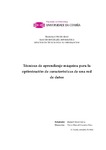Mostrar o rexistro simple do ítem
Técnicas de aprendizaje máquina para la optimización de características de una red de datos
| dc.contributor.advisor | Carneiro Díaz, Víctor Manuel | |
| dc.contributor.author | Orois García, Manuel | |
| dc.contributor.other | Enxeñaría informática, Grao en | es_ES |
| dc.date.accessioned | 2021-02-17T16:28:00Z | |
| dc.date.available | 2021-02-17T16:28:00Z | |
| dc.date.issued | 2020-09 | |
| dc.identifier.uri | http://hdl.handle.net/2183/27338 | |
| dc.description.abstract | [Resumen] Dentro del campo de la Inteligencia Artificial, cuya finalidad es proporcionarle a los sistemas la capacidad de adquirir conocimientos por sí mismos para resolver problemas, nos encontramos con un subcampo como es el Machine Learning. Este tipo de Aprendizaje Automático, aplicado a las redes, permite realizar una mejor gestión así como un análisis de estas. Este proyecto se centra en el estudio de diversas técnicas de ML además de realizar una comparativa de los resultados obtenidos por cada una. Todo esto sirve para encontrar soluciones de optimización u operación de redes eficientes, como podría ser el retraso en el tráfico de extremo a extremo. Estas técnicas de aprendizaje automático son capaces de crear modelos de red ligeros con una buena precisión, por lo que facilitarían mucho el trabajo a los operadores de red actuales. Para ser capaces de conseguir esto, llevamos a cabo varias fases que incluyen la selección y posterior análisis de un dataset público, así como el estudio, implementación y aplicación de diferentes técnicas de machine learning (Random Forest, K-NN y Redes Neuronales) A partir de diversas pruebas y una buena preparación previa de los datos, se consiguieron los resultados óptimos para cada una de las técnicas mencionadas anteriormente. A partir de estos hemos comprendido que el que mejor resultados arrojó fue K-NN seguido muy de cerca por Random Forest. En cuanto a la Redes Neuronales, cabe decir que obtuvimos unos resultados buenos pero, en comparación con las otras técnicas, todavía hay mucho que mejorar. | es_ES |
| dc.description.abstract | [Abstract] In the field of the Artificial Intelligence, which main purpose is to make the sistems able to adquire knowledge by themselves to solve problems, we find ourselves with the subfield as machine learning. This kind of authomatic learning, applied to webs, let you make a better management and analysis of them. This project focus on studying several techniques of ML, moreover to make a comparative of the results obtained by each one. All this is useful to find optimization or operation solutions of efficient webs, as it could be the delay on the extreme-to-extreme traffic. These techniques of authomatic learning are able to create models of light web with good accuracy, which would make the job of the current web operators easier. To be able to do this, we make several stages, that include the selection and the next analysis of a public dataset, as the studying, implementation and application of the different machine learning techniques. (Random forest, K-NN and neuronal networks.) To start with several tries, and a good previous preparation of the data, there had been optimal results for each of the techniques previously named. From this, we had understood that the best of the results was of the K-NN, followed close by Random Forest. Speaking of neuronal webs, we could say we had good results, but comparing with the other techniques there is a lot of improvement looking forward. | es_ES |
| dc.language.iso | spa | es_ES |
| dc.subject | Machine learning | es_ES |
| dc.subject | Inteligencia artificial | es_ES |
| dc.subject | K-NN | es_ES |
| dc.subject | Random forest | es_ES |
| dc.subject | Redes neuronales recurrentes | es_ES |
| dc.subject | Regresión | es_ES |
| dc.subject | Artificial intelligence | es_ES |
| dc.subject | Recurrent neural network | es_ES |
| dc.subject | Regression | es_ES |
| dc.title | Técnicas de aprendizaje máquina para la optimización de características de una red de datos | es_ES |
| dc.type | info:eu-repo/semantics/bachelorThesis | es_ES |
| dc.rights.access | info:eu-repo/semantics/openAccess | es_ES |
| dc.description.traballos | Traballo fin de grao (UDC.FIC). Enxeñaría informática. Curso 2019/2020 | es_ES |






